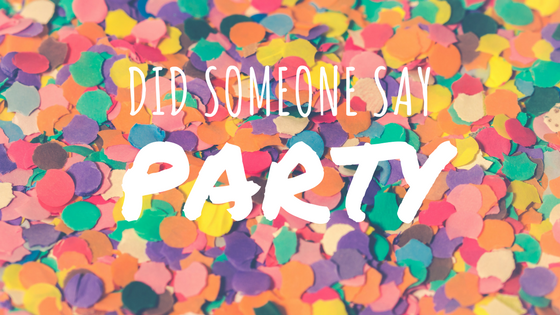
You’re likely revving up to spend this evening surrounded by people whose company you typically enjoy, drinking or dancing as a means of celebrating the passing of another year. In other words, you’re going to a party!
Your fellow party-goers may or may not enjoy this conversation starter: did you know that the word “party” originated in the 1630s, but didn’t become synonymous with merriment until the 1920s?
For more party fodder, here are 15 ways to say “party,” and a brief look at each word’s history:
celebration
Definition: to do something special or enjoyable for an important event, occasion, holiday, etc.
Etymology: First used in the 1520s; used in the 1570s to denote a performance of a religious ceremony.
bash
Definition: a festive social gathering
Etymology: The word first came to be synonymous with “party” in 1901, when “on a bash” was a popular slang phrase.
spree
Definition: an unrestrained indulgence in or outburst of an activity
Etymology: First used in 1804, to mean “a frolic, drinking bout.”
saturnalia
Definition: an unrestrained often licentious celebration
Etymology: The proper noun “Saturnalia” is the Latin name for the Roman festival honoring Saturn during the month of December. The common noun was first used in the 1590s, to mean a “time of merrymaking.”
wing-ding
Definition: a wild, lively, or lavish party
Etymology: The word was first used in the 1940s.
soiree
Definition: a formal party that is usually at night
Etymology: “Soir” means “evening” in Old French; “soiree” was first used in the late 1700s.
festivity
Definition: celebration and enjoyment
Etymology: From the Latin “festus,” meaning “of a feast,” the word was first used in the late 14th century.
Shindig
Definition: a usually large or lavish party
Etymology: First used in 1871, the word may have come from “shinty,” the name of a hockey-like game played in Scotland.
hootenanny
Definition: a gathering at which folksingers entertain often with the audience joining in
Etymology: First known use was in 1929.
get-together
Definition: an informal social gathering
Etymology: First known use was in 1911.
gala
Definition: a festive celebration, especially a public entertainment marking a special occasion
Etymology: The word’s original meaning, used in the 1620s, referred to “festive attire.” The current iteration was first used in the 1770s.
fete
Definition: a large party or celebration
Etymology: First used in the 1754, from the French word, “fête.”
blowout
Definition: a large and informal social gathering
Etymology: First used in the 1825, as a synonym for “brouhaha.” In 1908, it became a popular way to express a flat tire.
revelry
Definition: a wild and noisy celebration
Etymology: First used in the 15th century.
jubilee
Definition: a special anniversary, or a celebration at the time of such an anniversary
Etymology: According to the Online Etymology Dictionary, “the original notion was of a year of emancipation of slaves and restoration of lands, to be celebrated every 50th year.” The word began to be used more generally as a synonym for rejoicing in the 15th century.
Find the original article here https://goo.gl/9e82ud
